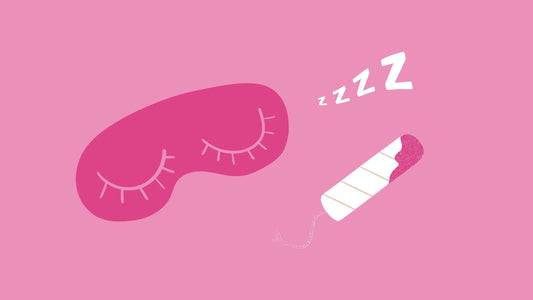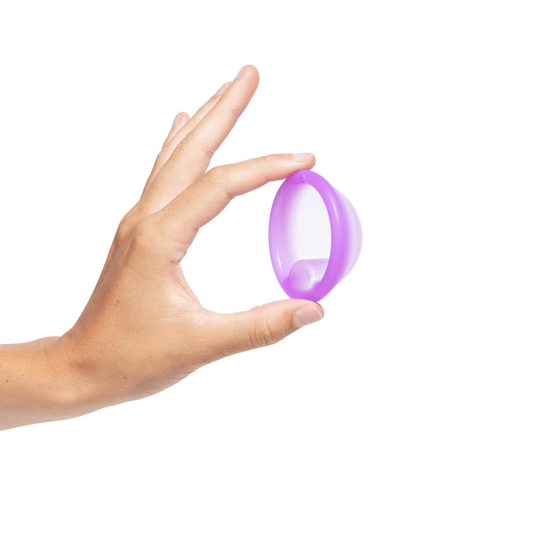
Can your menstrual cycle change after being sexually active?
Share
A lot of people wonder if their cycle changes after they have sex.
The truth is, there can be a lot of changes that occur when you start being sexually active.
Your body goes through a lot of changes when it becomes aroused, and many people experience different symptoms both during and after sex.
In this post, we will discuss the possible changes to your menstrual cycle after becoming sexually active. We will also talk about the different things that can happen to your body when you start having sex!

Can your menstrual cycle change after being sexually active?
In general, your menstrual cycle won't change too drastically other than if you get pregnant.
However most women do experience a few mild changes after they have become sexually active. Many women have compared improved menstrual symptoms post sexual activity, but only if you're reaching orgasm.
With more sex comes more oxytocin and a surge in certain hormones.
And as we know, hormones are what makes our menstrual cycles go round so the happiness hormone can have an impact on your menstrual cycle.
Oxytocin the "love hormone"

Oxytocin is released in large amounts during orgasm, labor, and breastfeeding. Many call is the "love hormone". It is produced in the hypothalamus, a part of the brain. Females generally have higher levels than males.
Below are some other effects of oxytocin on the body:
Less cravings
You may experience less cravings for sweets with your sudden increase of oxytocin.
More calm, less mood swings
oxytocin has been proven to calm even the most anxious of beings.
Counteracts cortisol (stress hormone)
There are also reports that oxytocin counteracts the effects of cortisol. Less stress means increased immunity and faster recovery.
The absence of oxytocin.
On the flip side you could be sexually active and not producing cortisol. Which can make some of your current symptoms a little worse.
Is sex stressing you out?
If sex or the pressure of an orgasm is stressing you out, your normal menstrual symptoms such as cramps, mood swings, etc. could be elevated.
More intense cramps
Vasocongestion (when your pelvic floor fills with blood due to sexual arousal) can sometimes intensify cramps.
Change in discharge
As you become more sexually active your discharge might be more present that before. Bacterial vaginosis (BV) can make discharge after sex more noticeable. It occurs when the pH of the vagina changes, disrupting the healthy balance of bacteria in the vagina.
iHaving a new sexual partner, multiple partners, or regularly douching can each the risk of developing BV.
Having a new sexual partner, multiple partners, or regularly douching can each increase the risk of developing BV.
BV can cause discharge to be off-white or gray and have a strong fishy odor. It may be easier to identify BV discharge after sex.
Make sure to talk to your doctor to get it checked out and properly diagnosed.
Why do I bleed after sexual intercourse?
Some women experience spotting or bleeding after sex. It's important to know that not all vaginal bleeding is menstrual bleeding.
Non-menstrual bleeding after sex can happen because of vaginal tears or certain types of cancers.
Factors that can change your period with or without sex
Birth control
In a previous post, we discussed options for non-hormonal birth control that didn't affect your menstrual cycle. What we didn't talk about though were the hundreds of hormonal birth control women are using that DO change your cycle and period.
Hormonal imbalance
One of the most popular and disguisable is a hormonal imbalance. There are so many things affecting our hormones today, that it is virtually impossible to know if this this is your problem.
You may have a hormonal imbalance if you have experienced weight gain, sudden weight loss, fatigue, purple stretch marks, mood swings, etc. This is more commonly monitored by your health professional that looks at your health in a more holistic approach.
Trauma or stress
When your body experiences trauma whether emotional or physical such a surgery, a really hard breakup, or death--your body may cause you to skip or delay your period. This trauma brings stress to your body putting more stress on your hormones.
Extreme exercise or weight loss
Your body is adjusting to the sudden weight drop or sudden exercise. That's why some women may skip a period when they are getting in shape again.
PCOS
Polycystic ovary syndrome (PCOS) is a hormonal disorder common among women of reproductive age. Women with PCOS may have irregular or prolonged menstrual periods or excess male hormone (androgen) levels. The ovaries may develop numerous small collections of fluid (follicles) and fail to regularly release eggs. PCOS (Polycystic ovary syndrome) is characterized by higher, sustained levels of certain hormones than normal.
Can your menstrual cycle change after being sexually inactive?
No sexual activity can have an adverse effect on periods. A late period or a completely missed period could have various reasons, such as stress, illness or poor health, a lack of food and very intense exercise and/or pregnancy medications that contain hormones or anything from the above list.
Can sex start or delay your period?
Sex alone has no effect on delaying periods or preventing them from occurring. Approximately 9% of menstruating women experience vaginal bleeding after sex that's unrelated to their period.








